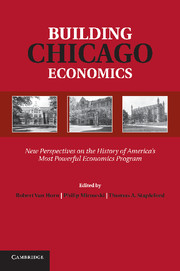 Building Chicago Economics
Building Chicago Economics Book contents
- Frontmatter
- Contents
- Figures and Tables
- Contributors
- Blueprints
- Orientation: In Search of the Chicago School
- Part One Economics Built for Policy: the Legacy of Milton Friedman
- Part Two Constructing the Institutional Foundations of the Chicago School
- Three The Price Is Not Right
- Four Sharpening Tools in the Workshop
- Five George Stigler, the Graduate School of Business, and the Pillars of the Chicago School
- Part Three Imperial Chicago
- Part Four Debating “Chicago Neoliberalism”
- Index
- References
Three - The Price Is Not Right
Theodore W. Schultz, Policy Planning, and Agricultural Economics in the Cold-War United States
from Part Two - Constructing the Institutional Foundations of the Chicago School
Published online by Cambridge University Press: 05 November 2011
- Frontmatter
- Contents
- Figures and Tables
- Contributors
- Blueprints
- Orientation: In Search of the Chicago School
- Part One Economics Built for Policy: the Legacy of Milton Friedman
- Part Two Constructing the Institutional Foundations of the Chicago School
- Three The Price Is Not Right
- Four Sharpening Tools in the Workshop
- Five George Stigler, the Graduate School of Business, and the Pillars of the Chicago School
- Part Three Imperial Chicago
- Part Four Debating “Chicago Neoliberalism”
- Index
- References
Summary
In the early winter of 1945, the Committee for Economic Development (CED) met to discuss the wording of their new pamphlet, “Agriculture in an Expanding Economy,” with University of Chicago economist Theodore Schultz. The arguments under discussion were his and would be featured in his forthcoming book, Agriculture in an Unstable Economy, published with the support of the CED by McGraw-Hill. In attendance were other members of the CED Advisory Board: Sumner Slichter, a professor at the Harvard Business School, William Benton, vice president of the University of Chicago, and Beardsley Ruml, former head of the Laura Spelman Rockefeller Fund, policy advisor to FDR, and Treasurer of Macy’s. Schultz attempted to put his associates at ease: They were mindful of how the mandate of their organization – the promotion of free enterprise – would fit into a discussion about heavily subsidized American agriculture.
Several of the members were unclear about Schultz’s vision. According to his rationale, government planning could help those farmers on the cusp of modernizing their operations to do so, as well as help those who lacked the education and resources to take advantage of agricultural modernization to migrate to the cities. When several members questioned how this proposal might be received by the public, given that it could be construed as another move toward socialism, Schultz reduced his grand program to its lowest common denominator: “It is based on classical economics – if earnings are too low then there are too many people and some must get out.” Finally, Schultz boldly stated that it was possible to plan to facilitate a relatively free market, at least given the recalcitrance of the large farm organizations: “There is a great amount of government control and a great amount of individual freedom in the farm picture at the present time. We may need more government to give the farmer greater freedom.”
- Type
- Chapter
- Information
- Building Chicago EconomicsNew Perspectives on the History of America's Most Powerful Economics Program, pp. 67 - 92Publisher: Cambridge University PressPrint publication year: 2011
References
- 3
- Cited by
